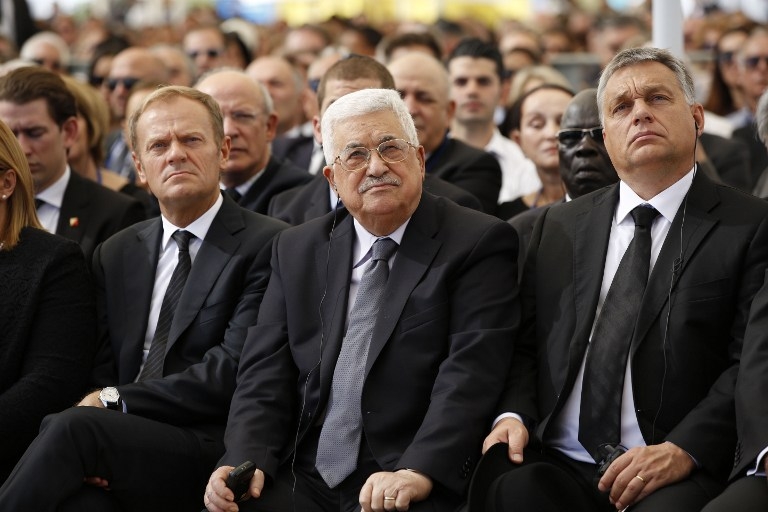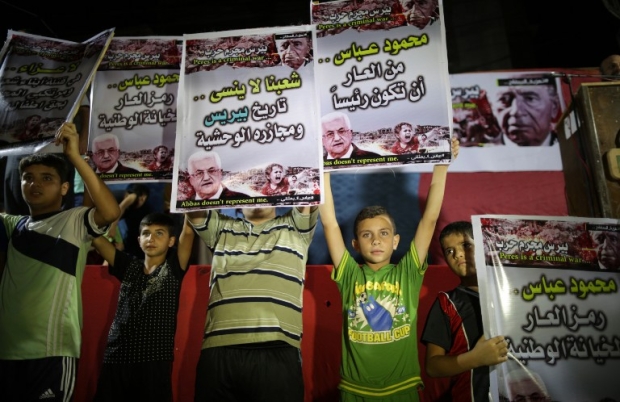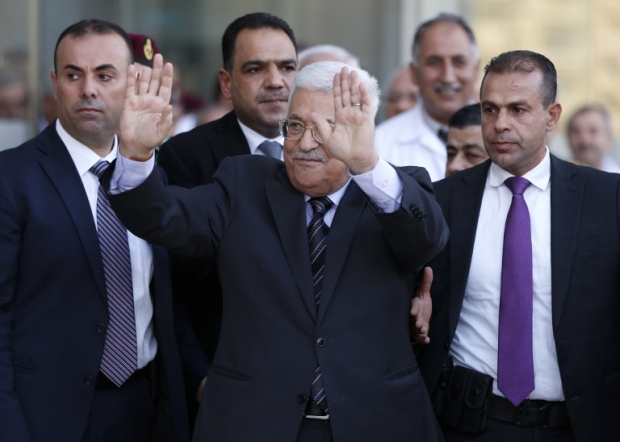The Peres funeral, Abbas and the endless death of the Oslo lie

It was a perfect microcosm of the Oslo peace process: Mahmoud Abbas, the Palestinian president, requesting permission from the Israeli military to attend the funeral of Shimon Peres.
You can be – as Peres put it about Abbas – the best Palestinian leader possible for Israel, and you’ll still need a permit to leave your settlement-encircled Bantustan
Abbas, the only Arab leader to attend the Jerusalem burial (even Palestinian members of Knesset stayed away), did not see the irony. But his decision, which prompted anger and mockery from Palestinian political factions, opinion-formers and social media users, was not a surprise – and nor was the justification.
Responding to the vociferous and widespread criticism, a senior Fatah official claimed that Abbas’s participation in the funeral was “a Palestinian message of peace to the world” and “stopped Netanyahu from showing the Palestinians as terrorists".
It is extraordinary – despite years of manifest failure, despite intensified and expanded Israeli colonisation, despite a record-breaking military aid package for Israel from Barack Obama – despite all of this and more, the Palestinian Authority (PA) leadership is still banging the same drum.
The futility of playing along
The defence offered for Abbas’s participation in the funeral reminded me of something I once heard Saeb Erekat – who accompanied Abbas to pay his respects to Peres – tell an audience when asked why PA forces were arresting Palestinians in cooperation with the Israeli occupation authorities.
With no political pressure on the occupier and coloniser, the international institutions-led focus on ‘state building’ and ‘good governance’ can never actually lead to a state or a government
Erekat did not shy away from the question; he confidently responded that these arrests take place in order to show the world that a Palestinian state would not be a threat.
Putting any other considerations aside, this is just not how it works. Israel is perfectly happy with the status quo, and no matter how much you impress Washington, London or Brussels, there is no political will to force Israel to end its apartheid policies.
In other words, you can be – as Shimon Peres put it, speaking of Abbas – the best Palestinian leader possible for Israel, and you’ll still need a permit to leave your settlement-encircled bantustan.
This is not some brand-new insight or revelation. In an article published 18 years ago this week, the late, and much-missed, Edward Said was already exposing the “bankruptcy of the vision proclaimed by Oslo, and of the leadership that engineered the whole wretched thing".
And yet here we are, in 2016, and Palestinian "statehood" is still being constructed out of good behaviour reports from the World Bank.
Yet in the context of military rule and colonial control, with no political pressure on the occupier and coloniser, the international institutions-led focus on "state building" and "good governance" can never actually lead to a state or a government.
Meanwhile, though the Palestinian public ascribes blame for the farcical suspension of the municipal elections to a number of actors, the majority see the Ramallah court’s decision as political, not legal.
More than 60 percent of Palestinians in the West Bank and Gaza Strip want Abbas to resign now – they are not all Hamas supporters. Only 46 percent believe the PA is an “asset” – 47 percent believe it is a burden.
The 'day after' cometh
Earlier this week, Abbas went to hospital after having collapsed from exhaustion. The Fatah leader is 81-years-old and manoeuvres to succeed him have been underway for some time.
That is because the problems are bigger than one man, and the sight of Abbas mourning for Shimon Peres is indicative of a wider malaise, rather than a single error of judgement.
The next head of the PA inherits a bloated, autocratic entity many cannot imagine life without, yet by its stagnation and corruption, its lack of political imagination and dependence on the occupier and donors, it is bringing the "day after" – whatever that looks like – ever nearer.
- Ben White is the author of Israeli Apartheid: A Beginner’s Guide and Palestinians in Israel: Segregation, Discrimination and Democracy. He is a writer for Middle East Monitor, and his articles have been published by Al Jazeera, al-Araby, Huffington Post, The Electronic Intifada, The Guardian’s Comment is free, and more.
The views expressed in this article belong to the author and do not necessarily reflect the editorial policy of Middle East Eye.
Photo: Palestinian president Mahmud Abbas sits alongside European Council President Donald Tusk and Hungarian Prime Minister Viktor Orban at the funeral for Shimon Peres on 30 September 2016 (AFP)
New MEE newsletter: Jerusalem Dispatch
Sign up to get the latest insights and analysis on Israel-Palestine, alongside Turkey Unpacked and other MEE newsletters
Middle East Eye delivers independent and unrivalled coverage and analysis of the Middle East, North Africa and beyond. To learn more about republishing this content and the associated fees, please fill out this form. More about MEE can be found here.




